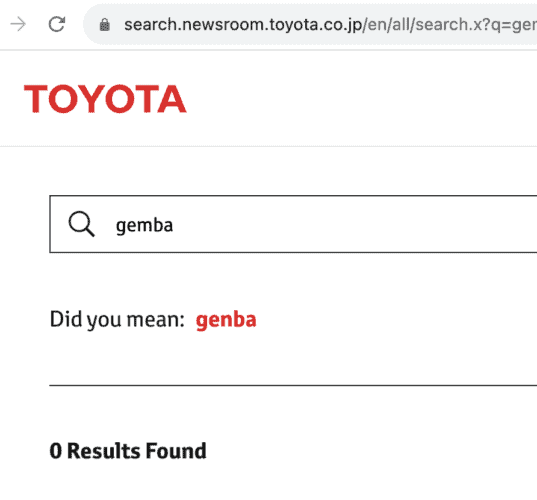tl;dr: Same word, same meaning, different spellings.
I was taught that the English version of the Japanese word that means, basically, “the real place” or “the shopfloor” is spelled:
“Gemba”
And we see that spelling used quite often, including:
- Gemba Academy
- Masaaki Imai's book Gemba Kaizen
- Jim Womack's book Gemba Walks
- Michael Bremer's book How to Do a Gemba Walk
So “gemba” doesn't seem wrong.
Some companies and sources use “GEMBA,” but there's no reason for it to be in all caps. That might be the only incorrect option.
But, in recent years, I've seen more references to the same word being spelled “genba” with an “n.”
Many say that “genba” is the technically correct spelling these days. But it used to be translated as “gemba.”
Confusing, right?
I've heard that the variation in English / Western spelling is a matter of the difficulties in translating from Japanese kanji characters (現場) to the Roman / Latin alphabet — and that the sound of the letter in Japanese might sound like an “m” or an “n.” Some say the “n” and “ba” together sound like an “m,” which confuses people.
There are some books that use the “n” spelling in the title:
- Stories From The Genba: Conversations With Japan-Insider Country Managers
- Super Genba: Ten Things Japanese Companies Must Do to Gain Global Competitiveness
The spelling “Genba” just looks incorrect to me when used in a Lean context, even though I know it's not a typo. There's more to it than that.
I normally don't spend too much thinking about this — and I'm certainly not spending time online arguing about which is correct. So why am I blogging about this?
Hear Mark read this post — subscribe to Lean Blog Audio
A Question — Email From a Listener:
But I was prompted to think about this recently when I received an email from a podcast listener:
“So I heard an interesting distinction between Gemba and Genba today.
The M version is a place of work
The N version is a place of investigation (used by Japanese police).
So you go to the place of work before you go to the place of investigation.”
Hmmm. I had never heard that. So I thought I'd do a little research and check with friends who have varying levels of Japanese language skills.
Jon Miller:
Jon grew up in Japan and wrote about this as a comment on this blog post:
Yes. “Gemba” is the same as “genba,” and it does mean “actual place” and, in common use, “factory floor” or “workplace.”
He also replied to an email about this, saying:
“Both spellings same word same meaning. 現場, actual place. Cops say “let's go to the…” when they mean crime scene, accident scene, etc. Filming on location, reporting from a warzone, construction site, shop floor, all the same gemba / genba.”
Dan Markovitz:
Dan lived and worked in Japan after college. He replied to my email:
“In my experience and classroom instruction, it's just a matter of transcribing Japanese sounds into Roman letters. In Japanese, the word is spelled with the phonetic symbol corresponding to “n,” so technically, you could spell it “genba” and be correct. However, I suspect that it just sounds better with an “m,” and hence we use the word “gemba.””
Katie Anderson:
Katie, author of Learning to Lead, Leading to Learn, lived in Japan and studied Japanese for a few years recently. Her reply to my email:
“It is the way the Japanese language is translated to Roman characters.
So genba is actually correct.
But somewhere along the line, English speakers heard it as gemba and that is what was popularized.
But there is no “gemba” that can be written in Japanese :) “
Hide Oba:
Hide is a TPS consultant, the son of the late Hajime Oba. Check out my podcast episode with Hide.
Here is his reply to me, as a native Japanese speaker:
“I also don't care about the spelling, but I posted about this topic.
I only found the difference in translation style, no difference in meaning.
We don't have different pronunciations of this word, genba.”
Here is the blog post he wrote and shared with me about Genba.
Other Voices / Articles:
By Art Smalley: Is it Genba or Gemba?
He says “genba” is technically correct and adds:
“Personally I use the “Genba” spelling version simply because I learned it that way in Japan in language classes long before I ever worked for Toyota Motor Corporation in Aichi Prefecture or became a lean consultant. Old habits (especially when they are technically correct) are hard to break. And this one I really don't think particularly matters all that much in the end. British English and American English often for example have words which are spelled or pronounced slightly differently and yet we manage to communicate.“
A Toyota UK Website: Genba – Toyota Production System guide
The funny thing here is that the article was originally written using the word “genba.”
But a former Toyota UK employee posted a snippy comment:
“The word is GEMBA. Please correct this as it undermines the perceived Toyota knowledge base. I've already raised this once without response (something completely unacceptable when I was a TMUK Quality Engineer!)”
So a Toyota blogger responded:
“Either Genba or Gemba is acceptable as the word does not translate directly into English.”
Toyota's Global Website:
This was sent to me by a LinkedIn connection:
“I had the same conversation with colleagues and found an interesting correction in Toyotas web site.
If you search for the word Gemba in Toyota's global site you get 0 results and it asks if you meant Genba. Looking for Genba brings up all of Toyota's articles.
There is no real difference, but I found it interesting.”

ChatGPT:
I asked the bot since that's what we do nowadays:
“The terms “gemba” (現場) and “genba” are actually different romanizations of the same Japanese word, and there is no difference between them in terms of their meaning in the context of Lean Manufacturing and the workplace. They are both used to refer to the “real place” or the “actual place” where work is performed or where value is created in an organization.”
And my human friends agree.
Final Thoughts: Spelling Matters Less Than Practice
Whether you spell it Gemba or Genba, what truly matters is that you go there.
The heart of Lean isn't in the transliteration–it's in the behavior: showing up at the actual place, observing with respect, asking good questions, and engaging people in improvement.
Spelling may vary, but purpose shouldn't.
If you're leading Lean efforts, don't get too caught up in orthographic debates. Focus on building a culture where leaders go to the real place, see the real work, and support real problem solving.
Call to Action:
Have you had experiences where Gemba walks brought clarity–or where the term itself caused confusion?
Please scroll down (or click) to post a comment. Connect with me on LinkedIn.
Let’s build a culture of continuous improvement and psychological safety—together. If you're a leader aiming for lasting change (not just more projects), I help organizations:
- Engage people at all levels in sustainable improvement
- Shift from fear of mistakes to learning from them
- Apply Lean thinking in practical, people-centered ways
Interested in coaching or a keynote talk? Let’s talk.
Join me for a Lean Healthcare Accelerator Trip to Japan! Learn More










beep bop bork GEMBA and LEAN should always be in all caps
just kidding.
LOL is that your ChatGPT voice or the Swedish Chef?
This is fascinating Mark, and it brings up an aspect of “Gemba” that I’m also curious about. Is it, “Go to Gemba” or “Go to the Gemba”? In the definitions above, it’s referred to as “the real place” and “real place”. So both can be true. Even though I generally avoid jargon in my continuous improvement work, I like the word “gemba” and English doesn’t offer up anything as intriguing. But when I do introduce it, I use “actual place” as the definition, because the phrase “Go to Gemba” feels like a tougher sell, and a bit awkward, for people learning to solve process problems. What do you think?
I guess I’ll fall on the “it doesn’t really matter” camp on that one. Neither one, “going to gemba” or “going to the gemba” sounds particularly awful or better to me.
I do agree we have to be careful with jargon… but gemba is a very flexible word.
We could say “shopfloor” in a factory but that’s not the only place where work is done in a manufacturing company.
This was sent to me by a LinkedIn connection:
“I had the same conversation with colleagues and found an interesting correction in Toyotas web site.
If you search for the word Gemba in Toyotas global site you get 0 results and it asks if you meant Genba. Looking for Genba brings up all of Toyotas articles.
There is no real difference, but I found it interesting.”
The search results:
https://search.newsroom.toyota.co.jp/en/all/search.x?q=genba&pagemax=20
I’ll add that to the post.
It’s funny that the Wikipedia entry address / URL uses “gemba” but then says that the word is “genba” (also romanized as “gemba.”).
https://en.wikipedia.org/wiki/Gemba
I’m prefer used ‘Gemba’ as to remember Masaaki Imai who is a 1st person promote with his book “Gemba Kaizen”. This was shared by one of Shingijutsu sensei (retired from TMC)
TPS purpose is to « Make job easier and develop human capital ».
So let’s make it simple and accessible to all members : Gemba=Genba !!
Thoughts from Reiko Kano, who I have met and worked with in Japan during some study trips:
Comments are closed.